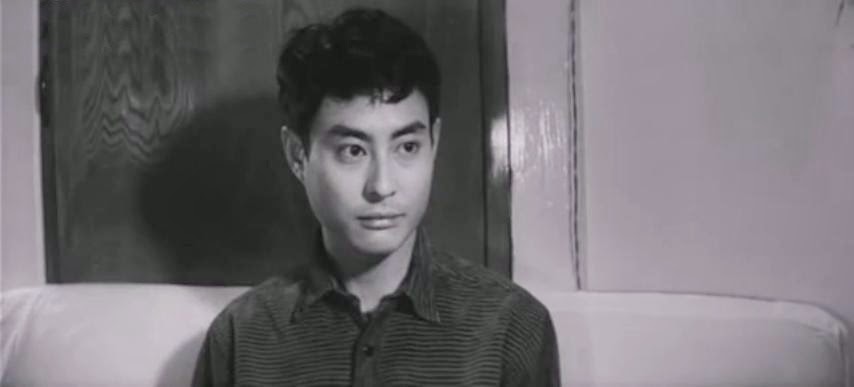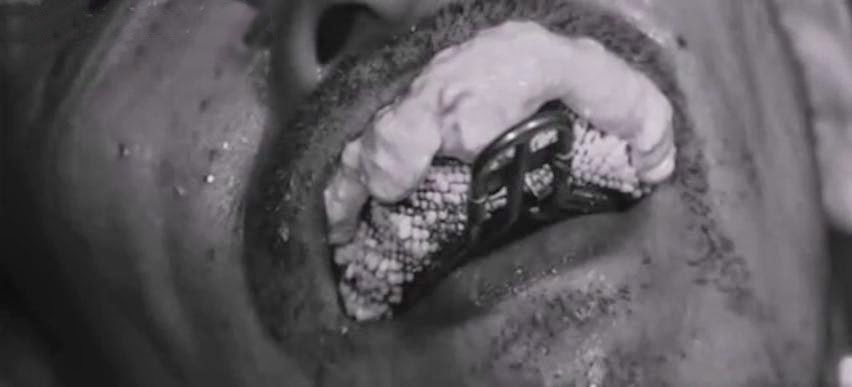... aka: Day-dream
... aka: Träume im Zwielicht (Twilight Dream)
Directed by:
Tetsuji Takechi
In 1962, director Satoru Kobayashi made Nikutai no Ichiba ("Flesh
Market"); the first official Japanese film featuring both sex and nudity and
made decidedly for adult audiences, and thus the "eroduction" genre (or as it
would later be called, the "pink film" or "pinku eiga") was born. Kobayashi's
film became a huge hit playing in more underground venues. Made for another
independent production company, Koji Seki's erotic adventure Jôyoku no
dôkutsu (called "Desire in Cavern" on the original poster and also known as
Cave of Lust) soon followed. Then came Tetsuji Takechi's Onna
onna onna monogatari (1963), a nudie pseudo-documentary featuring strippers,
geisha and the all-important female wrestlers, which became the third pink film
and was also the first of such films to get a release in America (under the
title Women... Oh, Women!). Under whatever title, the film was another
moneymaker. Takechi was then allowed to make a follow-up. Though it came two
years after the inaugural pink, Hakujitsumu ("Day-Dream") was the first
of its kind made on a big budget and the first of its kind to receive an
extensive marketing campaign. The production company went all out;
wide-releasing it in its homeland, getting it a screening at the Venice Film
Festival and issuing it theatrically in numerous other countries, including here
in America. In fact, it ended up doing so well on the sexploitation market in
the U.S. that it was re-issued a second time with new color dream sequences
added by distributor Joseph Green (of THE BRAIN THAT WOULDN'T DIE fame).
Things open with statements from both the writer of the source story and the
director, who notes the political nature of the film and justifies the unclothed
scenes by explaining "... nudity stands as much for man's extreme situation as
it does for human alienation." The credits feature white paint oozing down and
being squirted onto a wall, accompanied by a female's moans. We're then in a
dentist's office for more unsubtle sexual imagery like the sounds of drilling,
gurgling, spitting and people being probed in the mouth with fingers and phallic
dental instruments as the camera tilts this way and that way and shoots
everything from odd angles and large circular lights and fans are positioned
around like giant eyeballs gazing upon all the action. In the waiting room, Mr.
Kurahashi (Akira Ishihama) is waiting with an infected tooth when Cheiko
Hamuro (Kanako Michi) comes in. He's intrigued by the quiet young beauty
and can barely keep his eyes off of her. Both he and Cheiko are then called back
to the dentist (Chojuro Hanakawa) and his nurse (Yasuko Matsui) at
the same exact time. In preparation for getting his tooth yanked out, Mr. Kurahashi is given a shot of anesthesia and drifts off into la-la land for a
bizarre fantasy.
Kurahashi envisions the dentist biting Cheiko and drinking her blood. Next she
is a meek nightclub cabaret singer at the whim of her dominating and abusive
manager / lover (played by the same guy who plays the dentist). He takes her
home, ties her up, slaps her around, removes her shirt and bra with a scalpel
and scissors and then plays a game of "electricity" with her by wrapping wires
around her arms and shocking her. Kurahashi has to sit and watch the whole thing
play out from outside the window. In a brief color interlude, the mean lover
rubs blood on her chest. Next, Kurahashi is on the playground and Cheiko is a
monkey on a leash that he confess his love to before she vanishes. The mean lover
rips her clothes off numerous times, she turns into a mannequin after sex,
throws a pillow at a black cat drinking milk off the floor and runs through a
department store naked. I'm sure it all has something deep and profound to say
about sex or love or gender roles or male insecurity or obsession or something.
Or maybe it's just an excuse just to show tits and ass. It's rather difficult to
tell.
Like many other experimental / surreal films, I found this pretty tedious to sit
through. The soundtrack (frequently incorporating distorted sounds, echoing
sinister laughter, string plucking, weird sci-fi beats and a shrill dentist's
drill) is annoying in the extreme. There are lots of long unbroken shots of the
same repetitive actions; some lasting minutes at a time
for no apparent reason. It's all nicely photographed and there's some good
imagery in here from time to time, but it's wasn't enough to hold my interest.
But hey, if you're the type who likes to watch numerous 30-second shots of
someone having water squirted on their face with a water pick,
1-minute shots of blank screens, a minute of an anguished face barely
visible in the darkness and over three minutes of someone trying to run down an
escalator going up, then this may be the movie for you. The new color scenes
added by Green for the U.S. release - which were spliced in throughout the film
- featured full frontal nudity and more explicit soft-core sex starring extras
wearing masks, probably to disguise the fact they're not Japanese. For the
record, I viewed the original version as intended minus that footage.
Hakujitsumu is notable also as the very first sex film to fall victim to
Japanese censorship. As most exploitation connoisseurs know, the Japanese have
no issue allowing all manner of twisted perversions and oddball fetishes to pass
into their popular entertainment, but for the longest time had a law forbidding
showing genitalia or even pubic hair That began right here when a brief
glimpse of down-there-hair was censored with a white dot. For decades afterward,
filmmakers had two options in regard to full frontal nudity: either film it as
they wanted and have the censors either pixilate or fog out the offending areas,
or try to shoot around it. Numerous films opted for the latter but then tried to
make up for that by showing basically everything but the private parts
and / or upping the perversion to insane levels.
Takechi followed this success up with
Kōkeimu (or, "Dreams of the Red Chamber") the same year, which was attacked
by the censors, stripped of over 20 percent of footage and made incoherent in
the process (the removed footage has since been lost). The following year, he
made the highly-political Kuroi yuki ("Black Snow," 1965), which stirred
up a ton of controversy in its homeland after Takechi was arrested and tried on
obscenity charges, which were later dropped after other artists came to his
defense. Takechi would continue to make sporadic pink films through the late
60s, disappeared for much of the 70s and reemerged in 1981 with a more explicit
remake of Hakujitsumu, which became the first theatrical release in Japan
with hardcore sex. His final film; also blending graphic sex with horror, was
yet another partial remake: Hakujitsumu 2 (called either "Captured for
Sex" or "Daydream 2" in the U.S.); which was his final film. He passed away in
1988, but certainly left an indelible mark on Japanese cinema while he was
around.
All of Takechi's Hakujitsumu films were based on a short story (written
in 1926) by Jun'ichirô Tanizaki, who supposedly did not like Takechi's
adaptation of his work and didn't live to see the others (he died the following
year). In 1965, the same story was filmed in South Korea under the title
Chunmong ("Empty Dream"). Brief nude scenes (which were removed prior to
release) led to the arrest of that film's director, Yu Hyun-Monk, as well.
★★





























No comments:
Post a Comment